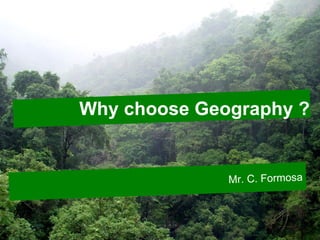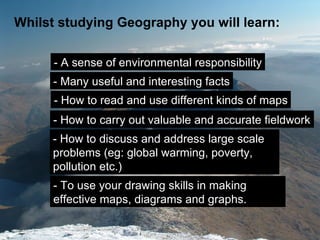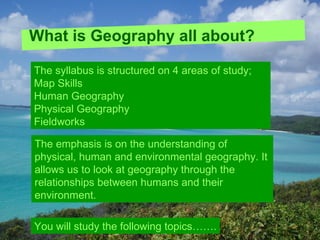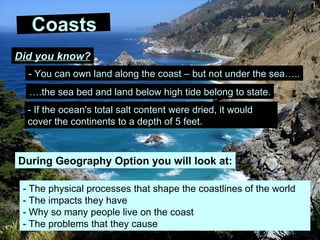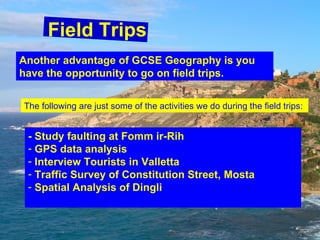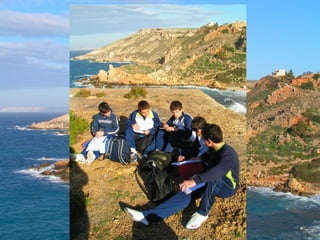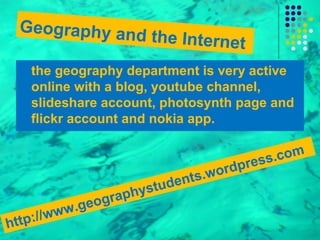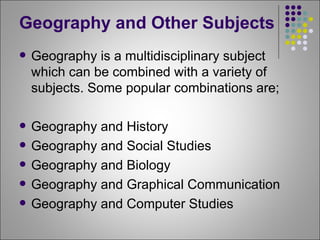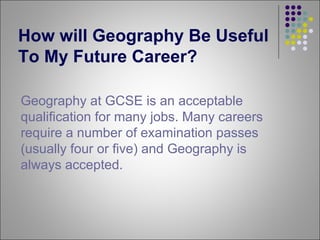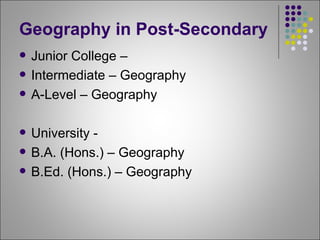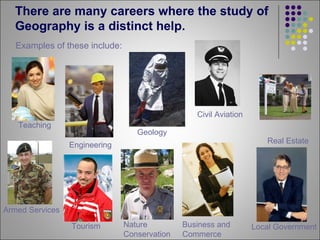Why Choose Geography
- 1. Why choose Geography ? Mr. C. Formosa
- 2. geography n the science of the surface of the earth and its inhabitants; the features or the arrangement of a place. â n geographer. â adj geographic or geographical. â adv geographically. Geography is the science of place and space. Geographers ask where things are located on the surface of the earth, why they are located where they are, how places differ from one another, and how people interact with the environment.
- 3. Whilst studying Geography you will learn: - A sense of environmental responsibility - Many useful and interesting facts - How to read and use different kinds of maps - How to carry out valuable and accurate fieldwork - How to discuss and address large scale problems (eg: global warming, poverty, pollution etc.) - To use your drawing skills in making effective maps, diagrams and graphs.
- 4. What is Geography all about? The syllabus is structured on 4 areas of study; Map Skills Human Geography Physical Geography Fieldworks The emphasis is on the understanding of physical, human and environmental geography. It allows us to look at geography through the relationships between humans and their environment. You will study the following topicsâĶâĶ.
- 5. Population Did you know? - That the earthâs population is growing by 9000 people an hour - Every 3.6 seconds someone dies of hunger. During Geography Option you will look at: - Why the population of the earth is changing - The challenges posed by a changing population - The social and economic implications of population change
- 6. Hazards Did you know? - At this moment in time you are standing on a moving slab of rockâĶ.. âĶ. it is moving at about the same speed your finger nails grow - There are over 1 million earthquakes a year, although only around 20 cause severe damage - Scientist have developed a cockroach fitted with a tiny camera called a Roboroach. They intend to use to search destroyed buildings for earthquake victims. During Geography Option you will look at: - What tectonic hazards are and what problems they pose - How people are affected by tectonic hazards
- 7. Resources Resources Did you know? - If everyone boiled only the water they needed to make a cup of tea instead of âfillingâ the kettle every time, we could save enough electricity in a year to run more than three quarters of the street lighting in this country. During Geography Option you will find out about: - Resources - The differences between renewable and non- renewable resources - How we produce energy - Whether the energy resources will ever run out
- 8. Water Water Did you know? - The rain that falls on you has fallen millions of times before - Every ten seconds a child on earth dies from a disease carried by dirty water. During Geography Option you will look at: - Where fresh water supplies come from - Why the demand for water is increasing - How we are spoiling our water supplies
- 9. Settlement Settlement Did you know? - In 2000, there were around 300 square km of derelict land in EnglandâĶâĶ âĶ.. thatâs enough space to build the city of Liverpool three times During Geography Option you will look at: - How demand for housing is increasing - Whether we should build on greenfield or brownfield sites - Why cities in poorer countries are growing so fast and the implications of this expansion
- 10. Industry Did you know? - In 2000, 70% of 16-24 year olds in the UK bought at least one item from the sports brand Nike. - Most of Nikeâs products are made in China and exported to countries such as USA and the UK. At one of their factories in Hung Wah, young women work from 7:30 am to 10:30 pm, seven days a week sewing Nike clothing. The average wage in the factory is just 13p an hour. During Geography Option you will look at: - How the global workplace is changing - Where the new jobs are located - How people can campaign against unfair working conditions
- 11. Coasts Coasts Did you know? - You can own land along the coast â but not under the seaâĶ.. âĶ.the sea bed and land below high tide belong to state. - If the ocean's total salt content were dried, it would cover the continents to a depth of 5 feet. During Geography Option you will look at: - The physical processes that shape the coastlines of the world - The impacts they have - Why so many people live on the coast - The problems that they cause
- 12. Tourism Tourism Did you know? Tourism employs more people than any other industry in the world During Geography Option you will look at: - Why the countryside is being increasing used for recreation - The environmental and human impact that Tourism brings - The ways in which it can be managed
- 13. Field Trips Another advantage of GCSE Geography is you have the opportunity to go on field trips. The following are just some of the activities we do during the field trips: - Study faulting at Fomm ir-Rih - GPS data analysis - Interview Tourists in Valletta - Traffic Survey of Constitution Street, Mosta - Spatial Analysis of Dingli
- 15. Geography an d the Internet the geography department is very active online with a blog, youtube channel, slideshare account, photosynth page and flickr account and nokia app. s.com rd pres ent s.wo phystud eogra ww.g ht tp://w
- 16. Geography and Other Subjects ïŽ Geography is a multidisciplinary subject which can be combined with a variety of subjects. Some popular combinations are; ïŽ Geography and History ïŽ Geography and Social Studies ïŽ Geography and Biology ïŽ Geography and Graphical Communication ïŽ Geography and Computer Studies
- 17. How will Geography Be Useful To My Future Career? Geography at GCSE is an acceptable qualification for many jobs. Many careers require a number of examination passes (usually four or five) and Geography is always accepted.
- 18. Geography in Post-Secondary ïŽ Junior College â ïŽ Intermediate â Geography ïŽ A-Level â Geography ïŽ University - ïŽ B.A. (Hons.) â Geography ïŽ B.Ed. (Hons.) â Geography
- 19. There are many careers where the study of Geography is a distinct help. Examples of these include: Civil Aviation Teaching Geology Real Estate Engineering Armed Services Tourism Nature Business and Local Government Conservation Commerce
- 20. If you want any further information on studying Geography then speak to a member of the Geography staff: Mr. C. Formosa Ms. L. Attard Ms. N. Said
